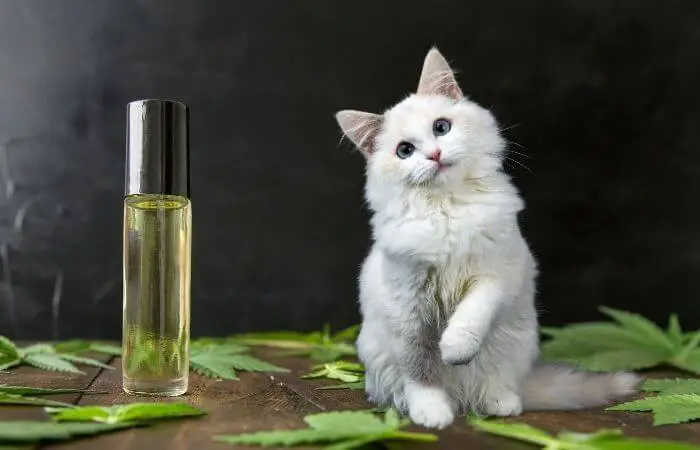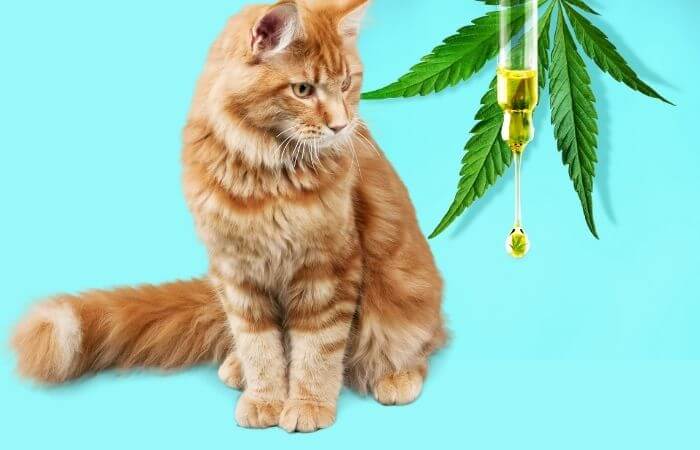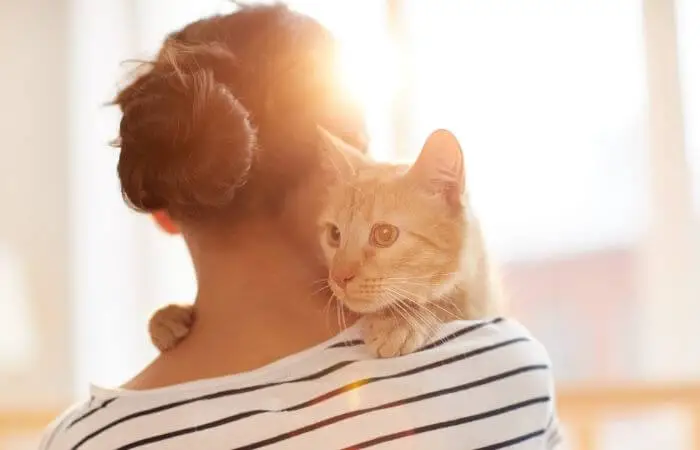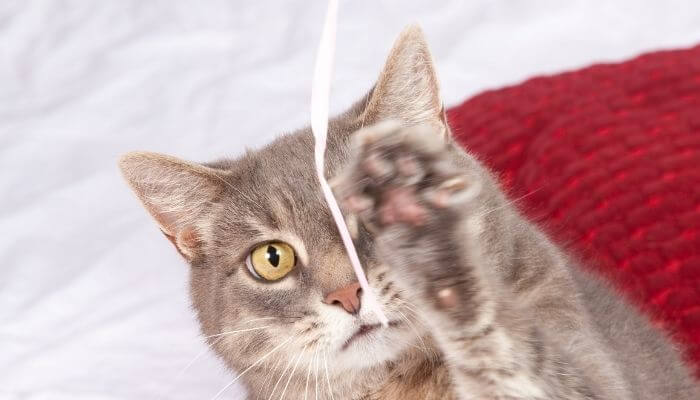Cannabinoids have been used for thousands of years in traditional medicine, and have been reported to help with all manner of ailments.
Their use is now illegal in many countries, mostly due to their psychoactive nature (the ‘high’) and potential for addiction.
In recent years, sales of human supplements containing cannabidiol (CBD) have gone through the roof. Naturally, this has led to a growing interest in the use of CBD in pets.
So, you’ve probably heard or read about CBD as a wonder cure for many issues your feline friend may be facing. Is there evidence to back these claims up?
Is CBD good for cats? Or indeed, is CBD safe for cats? Here’s what we know about CBD and cats.
Contents
What is CBD?

Cannabis plants contain many active compounds. One of these compounds is cannabidiol (CBD), which is found in high concentrations.
Tetrahydrocannabinol (THC) is another substance found in high concentrations.
THC is the psychoactive component, meaning it creates the ‘high’ that attracts recreational drug users.
Importantly, THC is toxic to animals. In contrast, CBD does not have any psychoactive properties and is claimed to have many benefits to humans and animals.
CBD acts on receptors found throughout the body, playing a beneficial role in the immune system, the nervous system and inflammation.
What CBD products are available for cats?
There are a huge number of CBD products on the market, due to its increasing popularity.
There are CBD cat treats, CBD oils, topical CBD creams, CBD powders, capsules and tinctures.
It is important to note that, currently, none have a UK veterinary marketing authorisation.
Is there research on CBD use in cats?

Unfortunately, to my knowledge, there are no published scientific studies on the use of CBD in cats.
This means that any information we do have has been pulled from studies on humans and / or dogs and from anecdotal evidence (such as owners reports).
There have been pre-clinical trials (as summarised in this review) on mice, rats and guinea pigs which reported benefits for a number of conditions; including cancer, pain conditions and conditions of the heart and lungs.
While this points to a need for clinical trials to see if the same benefits can be proven in pets, very few have been published so far.
The studies that have been done on dogs were on a small number of animals, which limits how we can use the results.
Despite many human trials, the only approved use of CBD in humans is for treatment of specific types of seizures. So, as you can see, much more research is needed!
What are the benefits of CBD for cats?
Unfortunately, due to the lack of scientific evidence, we don’t yet know!
If you search the internet, you will find many sites reporting that CBD helps cats with anxiety and other mood disorders, chronic pain and epilepsy.
CBD is being suggested as beneficial to cats in heat to help with the anxiety they sometimes experience during this time.
There are also anecdotal reports that CBD helps cats with Inflammatory Bowel Disease (IBD), allergies and kidney disease.
It certainly sounds like a miracle cure for all, but sadly we just don’t have the scientific evidence to back up these claims yet.
Is CBD use in cats legal?
The short answer is yes, but only under the instruction and supervision of a veterinary surgeon.
The Veterinary Medicines Directorate (VMD) class CBD containing products as veterinary medicines, and so they are regulated.
The 2018 VMD statement on CBD products states that all CBD-containing products need marketing authorisation before they can be sold, or supplied, here in the UK. Currently, none have been granted a UK veterinary marketing authorisation.
All of this means that a vet must prescribe a CBD product before you can treat your cat with it. Because there are no products authorised for veterinary use, your vet would have to prescribe a suitable human preparation.
As this British Small Animal Veterinary Association (BSAVA) information sheet explains, CBD can only be used as a complementary medicine.

This means that it can only be prescribed alongside medications that are proven to be effective, not on its own.
The Royal College of Veterinary Surgeons (RCVS, the regulatory body for veterinary surgeons) also issued a statement in 2017 about the use of complementary medicines.
In this statement they remind vets that they must not prescribe treatments that do not have scientific evidence to back them up. Part of the statement reads
“We would like to highlight our commitment to promoting the advancement of veterinary medicine upon sound scientific principles and to re-iterate the fundamental obligation upon our members as practitioners within a science-based profession which is to make animal welfare their first consideration.
In fulfilling this obligation, we expect that treatments offered by veterinary surgeons are underpinned by a recognised evidence base or sound scientific principles.
Veterinary surgeons should not make unproven claims about any treatments”.
Is CBD safe for cats? What are the side effects of CBD in cats?
CBD products might contain more than just CBD!
One risk of using CBD in cats is the lack of regulation of the products. Under UK law, all products must contain less than 0.2% THC.
Sadly, due to the lack of regulation, this is not always the case. It has been found that some products contain more THC, which can be toxic to cats (not to mention potentially being illegal).
Some products have also been shown to contain less, or even more, CBD than stated on the label; making accurate dosing impossible.
In one study in the USA, only a shocking 30% of the CBD products tested were accurately labelled.
In fact, in the USA, the United States Federal Drugs Administration have written many warning letters to CBD product companies, for reasons including false claims about CBD products and mislabelling.
Here in the UK, the Home Office Drug Licensing Factsheet for Cannabis, CBD and other cannabinoids states “It is our understanding that it is very difficult to isolate pure CBD, and in our experience many products in fact do not fully disclose their contents”.
The more expensive products will display their ‘certificate of analysis’ by an independent laboratory, which proves the ingredients and their concentrations.
Some hemp products have been shown to be contaminated with heavy metals, fungicides and pesticides; so the certificate of analysis should always include levels of these.
So, while CBD itself may be relatively safe, the additives and carriers in some CBD products may not be.
What are the other risks of CBD?
While CBD is generally believed to be relatively safe, there are a number of other risks to consider.
Most importantly, we don’t have the scientific evidence that we need from clinical trials to prove that CBD is safe for cats.
In addition, with so many health claims being suggested for CBD, there is concern that some well-meaning owners will be tempted to try CBD without consulting their vet first.
This could lead to diseases not being accurately diagnosed, and cats going without proven medical treatment and proper disease monitoring.
There is also a risk when giving CBD at the same time as some medicines.
Since CBD is processed by the liver, it may increase the side effects, or decrease the effectiveness, of other medicines that are processed by the liver.
On a lesser note, giving CBD treats may contribute to obesity, which is a growing problem in cats in the UK.
It is important to monitor your cats weight, as well as for any diarrhoea or sickness, after introducing any new treat.
Are there side effects of CBD in cats?
The most common side effects reported by owners include diarrhoea and sleepiness.
Cases of poisoning have been seen with overdose, or with products containing THC (including from cats nibbling on cannabis plants!).
Due to the lack of regulation, we cannot be sure if any side effects are due to the CBD itself, another ingredient or in fact a contaminant.
There is also the risk that no one currently knows what a safe, or indeed effective, dose for cats is.
There has been one preliminary safety assessment in healthy cats.
It is important to note that it was done ‘in healthy cats’- which might be a problem, since most owners wanting to try CBD for cats will be doing so because their cat is unwell in some way.
The results could well be different in cats with an underlying health condition. Eight cats were given CBD twice a day for twelve weeks.
They were monitored by vet exam and by blood sampling. Of the eight, one cat’s blood results showed an increased liver enzyme throughout the trial. More studies are needed to tell whether this is significant or not.
In terms of side effects, the cats in the study commonly shook their heads and licked excessively.
Other side effects noted included pacing, chewing, sickness and an increase in saliva.
From this preliminary assessment, the authors suggest that further work is needed to decide if CBD is safe for cats.
Final thoughts
Internet forums, websites and social media are full of rave reviews for CBD in cats, some from well-meaning owners and some from companies making CBD products.
However, there are currently some major set-backs to the use of CBD in cats.
The main problems are the lack of scientific evidence to back up these claims, along with the lack of regulation of CBD products.
Hopefully in the near future, we will have the scientific backing we need to be able to unlock the full potential of CBD.
As an Amazon Associate I may earn a small fee from qualifying purchases at no extra cost to you. This helps us run the site, so thanks for your support!







Leave a Comment